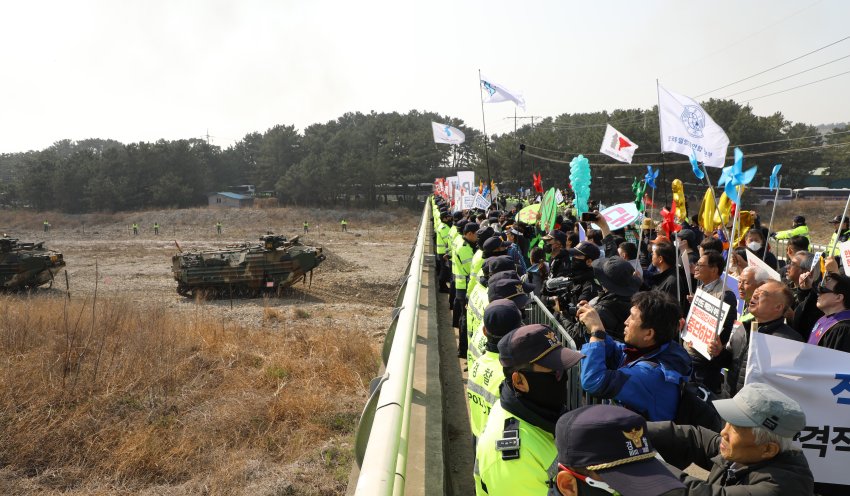by PETER BOYLE

The largest United States overseas military base in the world is in Pyeongtaek, South Korea. Known to the US military as Camp Humphreys, it is located next to a city with a population of more than half a million. The base is the garrison for about 28,500 US troops and has a huge airfield and numerous other military facilities.
While US nuclear weapons have not been officially based in South Korea since 1991, the current conservative government of President Yoon Suk-yeol is pursuing “extended deterrence” measures that will include redeploying US strategic nuclear weapons to the Korean Peninsula.
The South Korean government has to pay more than US$1 billion dollars a year to the US for the privilege of hosting the base. Under the current “defense-sharing” agreement this amount will reach US$1.32 billion a year by 2025. The former Donald Trump administration demanded US$5 billion a year.
Thousands of peace activists will form a human chain around the base on July 27 — the 70th anniversary of the 1953 Korean War armistice/ceasefire — as part of a campaign for an official agreement to end the Korean War
In the war, the US and 15 allies, including Australia, fought against North Korea, which was later supported by Chinese troops. Nearly 4 million people — more than half of them Korean civilians — were killed.
Some 10 million people were separated from their families and displaced by the time the ceasefire was declared.
The US, which had air superiority right through the war, dropped 635,000 tons of bombs — significantly more than the 500,000 tons it dropped throughout the Pacific during World War II.
US air raids destroyed 40–90% of major cities and villages in North Korea. The war also destroyed more than 40% of what little manufacturing infrastructure South Korea had in 1949, and more than 60% of the same in the North, according to US historian Bruce Cumings’ book The Korean War: A History.
Simultaneous actions will take place around the world as part of the campaign; a mass demonstration is planned in the South Korean capital Seoul, on July 22; a peace symposium “From Armistice to Peace” on July 27; and an international petition (which can be signed here).
Hwang Sooyoung, from Korea Peace Appeal — one of the groups organising the campaign to end the Korean War — told Green Left: “Most people might be surprised to hear that the Korean War has not ended officially. This year it will be 70 years since the Korean War armistice and in the Korean Peninsula we live under a very unstable armistice and this year the danger of war is unprecedentedly high.
“The military arms race is very serious so we think ending the Korean War is a fundamental solution for peace. Seventy years is enough!”
The Korea Peace Appeal has four demands, Hwang explained:
• End the Korean War and establish a peace agreement
• Create a Korean Peninsula and a world free from nuclear weapons and nuclear threat
• Resolve the conflict with dialogue and cooperation instead of sanctions and pressure
• Break from the vicious cycle of the arms race and invest in human security and environmental sustainability
Green Left for more
